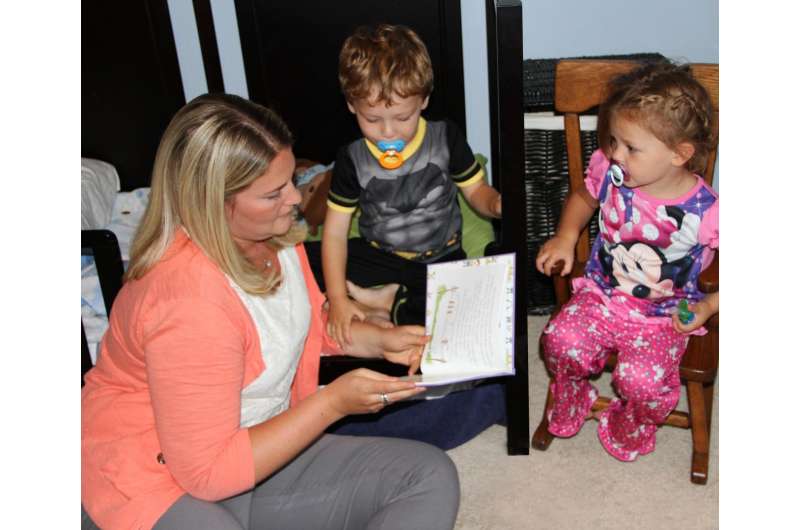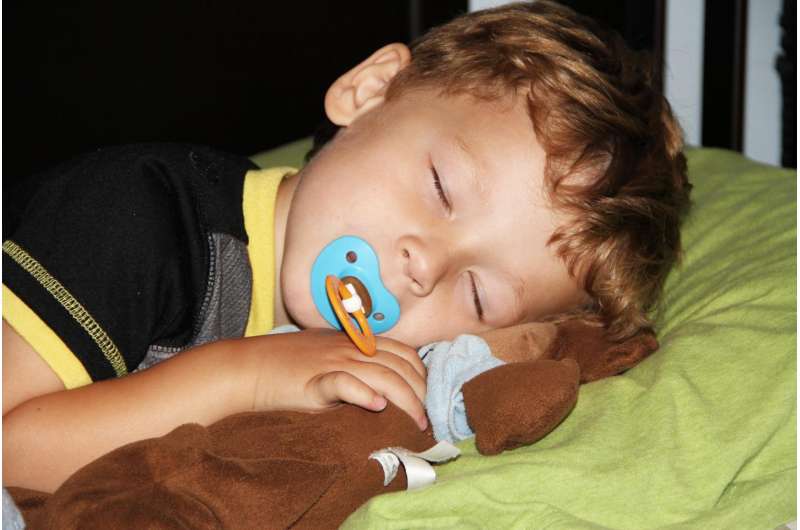Early preschool bedtimes cut risk of obesity later on

Preschoolers who are regularly tucked into bed by 8 p.m. are far less likely to become obese teenagers than young children who go to sleep later in theevening, new research has found.
Bedtimes after 9 p.m. appeared to double the likelihood of obesity later in life, according to a study from The Ohio State University College of Public Health.
"For parents, this reinforces the importance of establishing a bedtime routine," said Sarah Anderson, lead author and associate professor of epidemiology.
It also arms pediatricians with scientifically based advice for parents.
"It's something concrete that families can do to lower their child's risk and it's also likely to have positive benefits on behavior and on social, emotional and cognitivedevelopment," Anderson said.
Excess weight in children is a major health concern in the United States. Approximately 17 percent - 12.7 million - of children and adolescents are obese, according to the latest figures from the Centers for Disease Control and Prevention.
Obesity can set kids up for a lifelong struggle with weight and health complications that can accompany it, including diabetes and heart disease.
The new research, which appears in the The Journal of Pediatrics, used data from 977 children who were part of the Study of Early Child Care and Youth Development. Thatproject followed healthy babies born at 10 U.S. sites in 1991.

Anderson and her co-authors divided preschool bedtimes into three categories: 8 p.m. or earlier, between 8 p.m. and 9 p.m., and after 9 p.m. The children were about 4 ½years old when their mothers reported their typical weekday bedtime.
The researchers linked preschoolers' bedtimes to obesity when the kids were teens, at an average age of 15.
They found a striking difference: Only 1 in 10 of the children with the earliest bedtimes were obese teens, compared to 16 percent of children with mid-range bedtimes and 23 percent of those who went to bed latest. Half the kids in the study fell into the middlecategory. A quarter had early bedtimes and another quarter went to bed late.
Because the emotional climate at home can influence routines such as bedtime, Anderson and her colleagues also examined interactions between mothers and theirchildren during a videotaped playtime. Scientists call the measurement "maternal sensitivity" and it factors in maternal support, respect for the child's autonomy and lack of hostility.
Regardless of the quality of the maternal-child relationship, there was a strong link between bedtimes and obesity, the researchers found. But the children who went to bed latest and whose moms had the lowest sensitivity scores faced the highest obesityrisk.
The researchers also found that later bedtimes were more common in children who were not white, whose moms had less education and who lived in lower-incomehouseholds.
Previous research has established a relationship between short sleep duration and obesity. And one study found a correlation between late bedtimes and obesity risk fiveyears later. This new bedtime study is the first to use data on obesity collected about a decade after the children were in preschool, Anderson said.
Her team's previous research has illustrated the importance of household routines forpreschool-aged children and this builds on that work, she said.
Anderson said she and her co-authors focused on bedtimes because they have a greater impact on the duration of sleep than do wake times, over which parents have less control.
When parents and older siblings must get up and out the door early, that often means young children rise early as well.
Putting a child to bed early doesn't guarantee he or she will fall immediately into a deep sleep, Anderson said, but establishing a consistent bedtime routine makes itmore likely that children will get the amount of sleep they need to be at their best, Anderson said.
Recommending early bedtimes for young children may help to prevent obesity, and pediatricians are in a position to talk with parents about the importance of sleep forchildren's overall health. Pediatricians can also help to address obstacles families may face, she said.
"It's important to recognize that having an early bedtime may be more challenging for some families than for others," Anderson said.
"Families have many competing demands and there are tradeoffs that get made. For example, if you work late, that can push bedtimes later in the evening."
The majority of young children are biologically preprogrammed to be ready to fall asleep well before 9 p.m., according to previous research.
The study doesn't answer questions about how sleep time intertwines with a variety of other factors that can contribute to weight gain in childhood, including physical activity and nutrition, Anderson said, and that remains an active area of research.

















